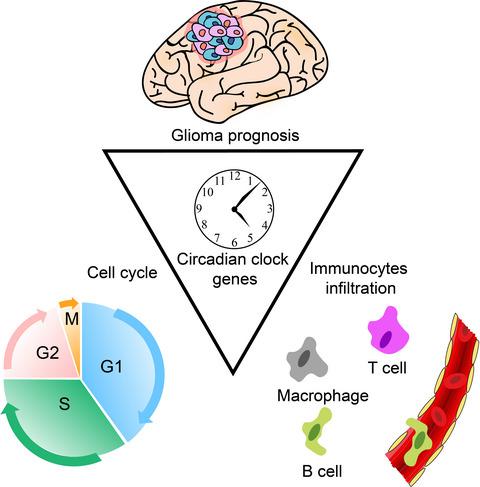当前位置:
X-MOL 学术
›
Cell Prolif.
›
论文详情
Our official English website, www.x-mol.net, welcomes your feedback! (Note: you will need to create a separate account there.)
Circadian clock genes promote glioma progression by affecting tumour immune infiltration and tumour cell proliferation
Cell Proliferation ( IF 8.5 ) Pub Date : 2021-01-13 , DOI: 10.1111/cpr.12988 Zeyu Wang 1 , Guanhua Su 1, 2 , Ziyu Dai 1 , Ming Meng 1 , Hao Zhang 1 , Fan Fan 1 , Zhengzheng Liu 3 , Longbo Zhang 1, 4 , Nathaniel Weygant 5, 6 , Fengqiong He 1, 7 , Ning Fang 8 , Liyang Zhang 1, 7, 9 , Quan Cheng 1, 7, 9, 10
Cell Proliferation ( IF 8.5 ) Pub Date : 2021-01-13 , DOI: 10.1111/cpr.12988 Zeyu Wang 1 , Guanhua Su 1, 2 , Ziyu Dai 1 , Ming Meng 1 , Hao Zhang 1 , Fan Fan 1 , Zhengzheng Liu 3 , Longbo Zhang 1, 4 , Nathaniel Weygant 5, 6 , Fengqiong He 1, 7 , Ning Fang 8 , Liyang Zhang 1, 7, 9 , Quan Cheng 1, 7, 9, 10
Affiliation

|
OBJECTIVES
Circadian rhythm controls complicated physiological activities in organisms. Circadian clock genes have been related to tumour progression, but its role in glioma is unknown. Therefore, we explored the relationship between dysregulated circadian clock genes and glioma progression. MATERIALS AND METHODS
Samples were divided into different groups based on circadian clock gene expression in training dataset (n = 672) and we verified the results in other four validating datasets (n = 1570). The GO and GSEA enrichment analysis were conducted to explore potential mechanism of how circadian clock genes affected glioma progression. The single-cell RNA-Seq analysis was conducted to verified previous results. The immune landscape was evaluated by the ssGSEA and CIBERSORT algorithm. Cell proliferation and viability were confirmed by the CCK8 assay, colony-forming assay and flow cytometry. RESULTS
The cluster and risk model based on circadian clock gene expression can predict survival outcome. Samples were scoring by the least absolute shrinkage and selection operator regression analysis, and high scoring tumour was associated with worse survival outcome. Samples in high-risk group manifested higher activation of immune pathway and cell cycle. Tumour immune landscape suggested high-risk tumour infiltrated more immunocytes and more sensitivity to immunotherapy. Interfering TIMELESS expression affected circadian clock gene expression, inhibited tumour cell proliferation and arrested cell cycle at the G0/G1 phase. CONCLUSIONS
Dysregulated circadian clock gene expression can affect glioma progression by affecting tumour immune landscape and cell cycle. The risk model can predict glioma survival outcome, and this model can also be applied to pan-cancer.
中文翻译:

生物钟基因通过影响肿瘤免疫浸润和肿瘤细胞增殖促进胶质瘤进展
目的 昼夜节律控制着生物体内复杂的生理活动。生物钟基因与肿瘤进展有关,但其在胶质瘤中的作用尚不清楚。因此,我们探讨了生物钟基因失调与神经胶质瘤进展之间的关系。材料与方法 根据训练数据集 (n = 672) 中的生物钟基因表达将样本分为不同组,我们在其他四个验证数据集 (n = 1570) 中验证了结果。进行 GO 和 GSEA 富集分析以探索生物钟基因如何影响神经胶质瘤进展的潜在机制。进行单细胞 RNA-Seq 分析以验证先前的结果。免疫景观由 ssGSEA 和 CIBERSORT 算法评估。细胞增殖和活力通过 CCK8 测定证实,集落形成试验和流式细胞术。结果 基于生物钟基因表达的聚类和风险模型可以预测生存结果。样本通过最小绝对收缩和选择算子回归分析进行评分,高评分肿瘤与较差的生存结果相关。高危组的样本表现出更高的免疫通路和细胞周期激活。肿瘤免疫景观提示高危肿瘤浸润更多免疫细胞,对免疫治疗更敏感。干扰 TIMELESS 表达会影响生物钟基因表达,抑制肿瘤细胞增殖并在 G0/G1 期阻止细胞周期。结论 生物钟基因表达失调可通过影响肿瘤免疫景观和细胞周期来影响胶质瘤进展。
更新日期:2021-01-13
中文翻译:

生物钟基因通过影响肿瘤免疫浸润和肿瘤细胞增殖促进胶质瘤进展
目的 昼夜节律控制着生物体内复杂的生理活动。生物钟基因与肿瘤进展有关,但其在胶质瘤中的作用尚不清楚。因此,我们探讨了生物钟基因失调与神经胶质瘤进展之间的关系。材料与方法 根据训练数据集 (n = 672) 中的生物钟基因表达将样本分为不同组,我们在其他四个验证数据集 (n = 1570) 中验证了结果。进行 GO 和 GSEA 富集分析以探索生物钟基因如何影响神经胶质瘤进展的潜在机制。进行单细胞 RNA-Seq 分析以验证先前的结果。免疫景观由 ssGSEA 和 CIBERSORT 算法评估。细胞增殖和活力通过 CCK8 测定证实,集落形成试验和流式细胞术。结果 基于生物钟基因表达的聚类和风险模型可以预测生存结果。样本通过最小绝对收缩和选择算子回归分析进行评分,高评分肿瘤与较差的生存结果相关。高危组的样本表现出更高的免疫通路和细胞周期激活。肿瘤免疫景观提示高危肿瘤浸润更多免疫细胞,对免疫治疗更敏感。干扰 TIMELESS 表达会影响生物钟基因表达,抑制肿瘤细胞增殖并在 G0/G1 期阻止细胞周期。结论 生物钟基因表达失调可通过影响肿瘤免疫景观和细胞周期来影响胶质瘤进展。


























 京公网安备 11010802027423号
京公网安备 11010802027423号